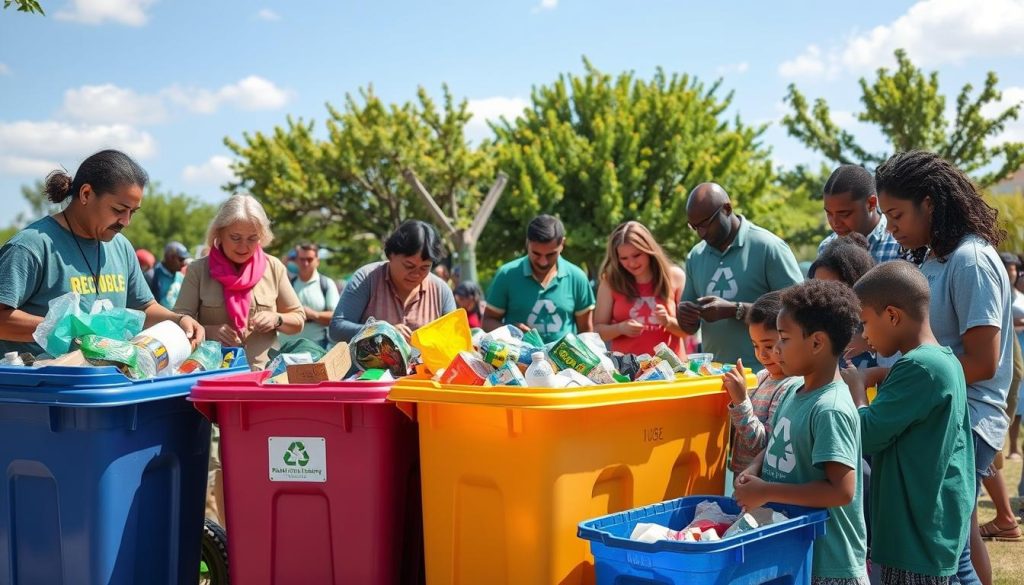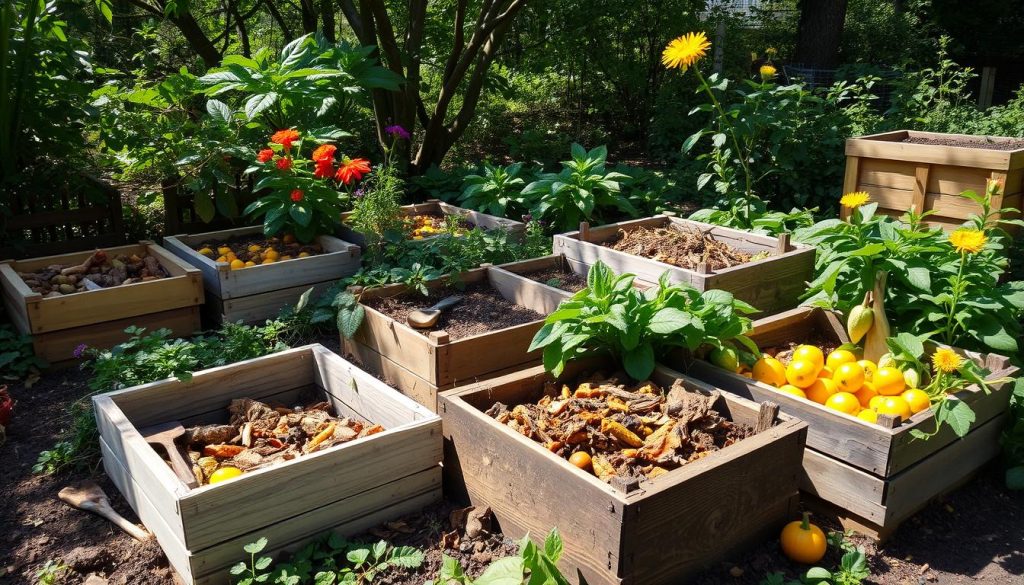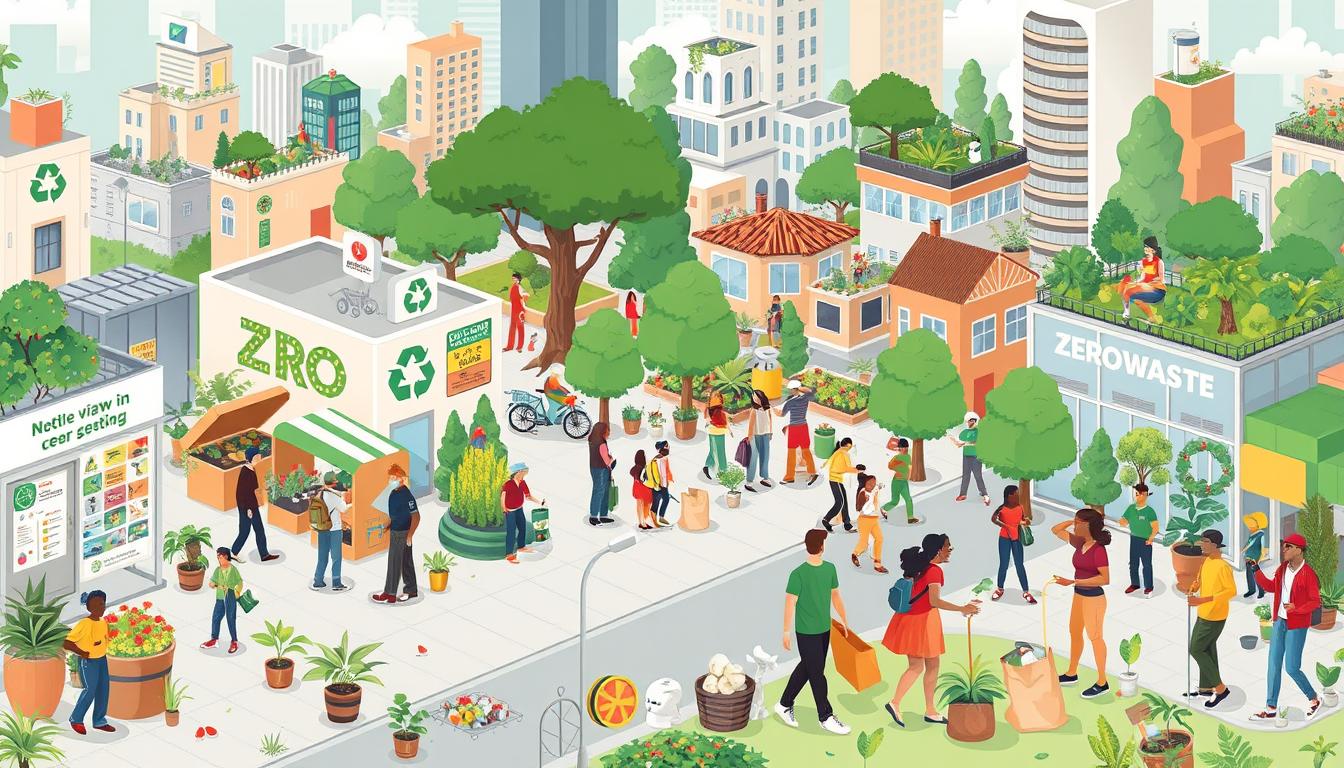The world is facing a big problem with waste management. The idea of “zero waste” is becoming more popular. But, making a zero-waste world is not simple. It depends on many things like where you live, the local setup, and what people do.
In this article, we’ll look at the different challenges of zero waste in different places. We’ll also talk about how we can make real changes in our communities.
Getting to zero waste is hard. It needs us to understand the special needs of each area. Whether it’s cities or countryside, the obstacles to reducing waste are different.
By recognizing these differences and creating plans that fit, we can make a big difference. This way, we can move towards a future that is better for our planet and for us.
Understanding the Concept of Zero Waste
The idea of zero waste is becoming more popular as we seek a greener future. It’s about managing waste in a way that reduces landfill use and promotes recycling. This approach helps us move towards a circular economy.
The Basics of Zero Waste
The zero waste method has a few main ideas. These include:
- Reducing waste at the source
- Using materials again and again
- Recycling and composting to avoid landfills
- Setting up good waste collection and processing
- Supporting products and packaging that are sustainable
By sticking to these ideas, we can aim for a world where waste doesn’t exist. Resources will keep flowing back into use.
The Importance of Regional Initiatives
Zero waste is a goal for both the world and local areas. It’s best tackled at the local level, where people can work together. Local programs that focus on reducing waste and recycling can make a big difference.
By adopting zero waste, communities can lessen their environmental impact. They also create new jobs and industries. As we face waste management challenges, local efforts are key to a greener future.
My Personal Experience with Zero Waste
My zero waste journey started a few years back. I looked closely at how my household affected the environment. I wanted to cut down on waste, so I explored zero waste strategies.
How I Started My Journey
I began by tracking our waste. I noted what we threw away and how much. Then, I looked for ways to reduce, reuse, and recycle more.
This helped us make quick changes. We started using reusable bags, got a compost bin, and found plastic-free alternatives.
The Challenges I Faced
Switching to zero waste wasn’t easy. Changing old habits and finding new products took time. Sustainable options were often pricier.
Also, finding zero waste resources in my area was tough. I had to do a lot of research and adapt.
Lessons Learned Along the Way
Despite the hurdles, my journey has been worth it. I learned the importance of patience and persistence. Trying new strategies and practices helped a lot.
I also realized how crucial community support is. Together, we can make a big difference. Every small choice we make helps build a better future.
Regional Zero Waste Challenges in the U.S.

To reach zero waste, we need a detailed plan for each area in the U.S. Community recycling programs and teamwork are key to fighting plastic waste and promoting green waste management.
Examples from Different States
In California, the goal is to recycle 75% of solid waste by 2020. Cities like San Francisco have made big strides, with over 80% of waste being recycled or composted.
New York City wants to cut landfill waste by 90% by 2030. This goal has brought people together, with many joining local recycling and waste reduction projects.
Collaborative Efforts and Community Engagement
In the Midwest, like Chicagoland, local groups, businesses, and non-profits are working together. They’re setting up recycling programs and teaching people about reducing plastic waste.
In Oregon, the “Recycling Starts with You” campaign is making a difference. It encourages people to reduce their waste and adopt eco-friendly habits. This has boosted recycling rates and spread the word on waste reduction.
I hope these examples motivate others to find ways to work together and engage their communities. This is crucial for tackling the unique zero waste challenges in their areas.
Tips for Overcoming Common Challenges

Starting my zero waste journey was not easy. I faced many challenges. But, through trying different things, I found ways to overcome them. I want to share these tips with you to help you on your own journey.
Effective Strategies I’ve Found
One strategy that worked for me is to start small. Trying to change everything at once is too much. Start with one area, like composting infrastructure or food waste prevention. Add new habits slowly, so they become part of your daily life.
Another good idea is to connect with your community. Look for groups focused on zero waste. Join workshops or talk to people who share your goals. Working together and sharing ideas can help you find solutions specific to your area.
Resources That Helped Me Succeed
- Online guides and tutorials on composting infrastructure and food waste prevention techniques
- Local government resources and initiatives focused on sustainable waste management
- Zero waste-focused blogs, podcasts, and social media communities
- Neighborhood and community-based programs that offer support and guidance
Using these strategies and resources, I’ve made big changes in my waste reduction. I hope these tips will help you on your zero waste journey. Let’s work together to make our communities more sustainable.
The Future of Zero Waste Initiatives
The future of zero waste looks bright. Communities across the United States are starting new projects. They aim to cut down on waste and make our planet greener.
Upcoming Regional Events to Watch
Next year, several big events will happen. They will bring together people who care about the environment. The Zero Waste Alliance’s summit in Seattle is one of them. It will share new ways to reduce waste.
The Circular Economy Expo in Chicago will also be a highlight. It will show off the latest in making products and recycling materials.
How I Plan to Contribute Moving Forward
I’m excited to keep helping the zero waste cause. I’ll work with my local task force on waste reduction. I’ll use my skills to teach others about waste.
I’m also looking to team up with environmental groups. We’ll work on new projects that can inspire others. These projects will show how we can live in a more circular way.

